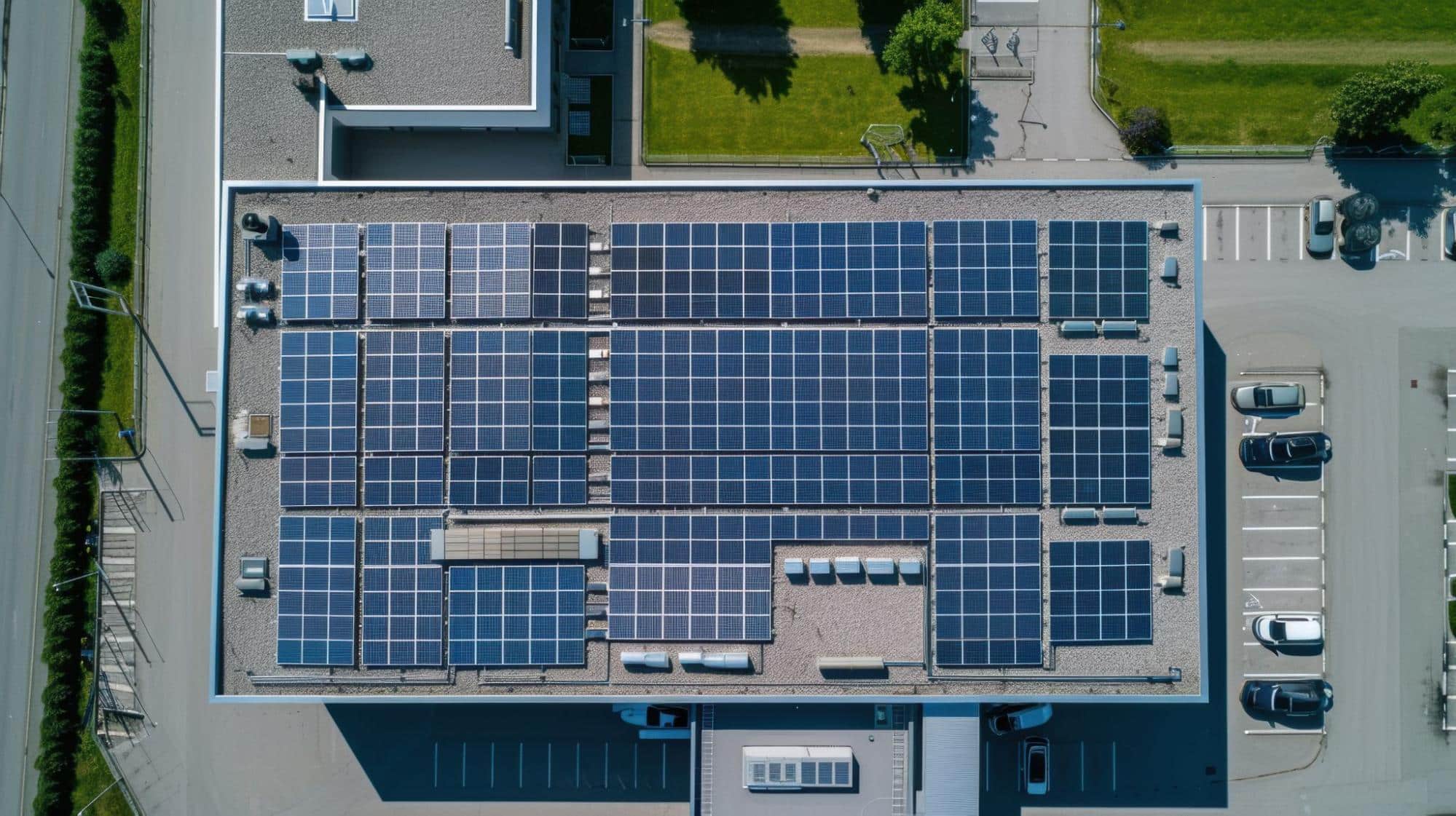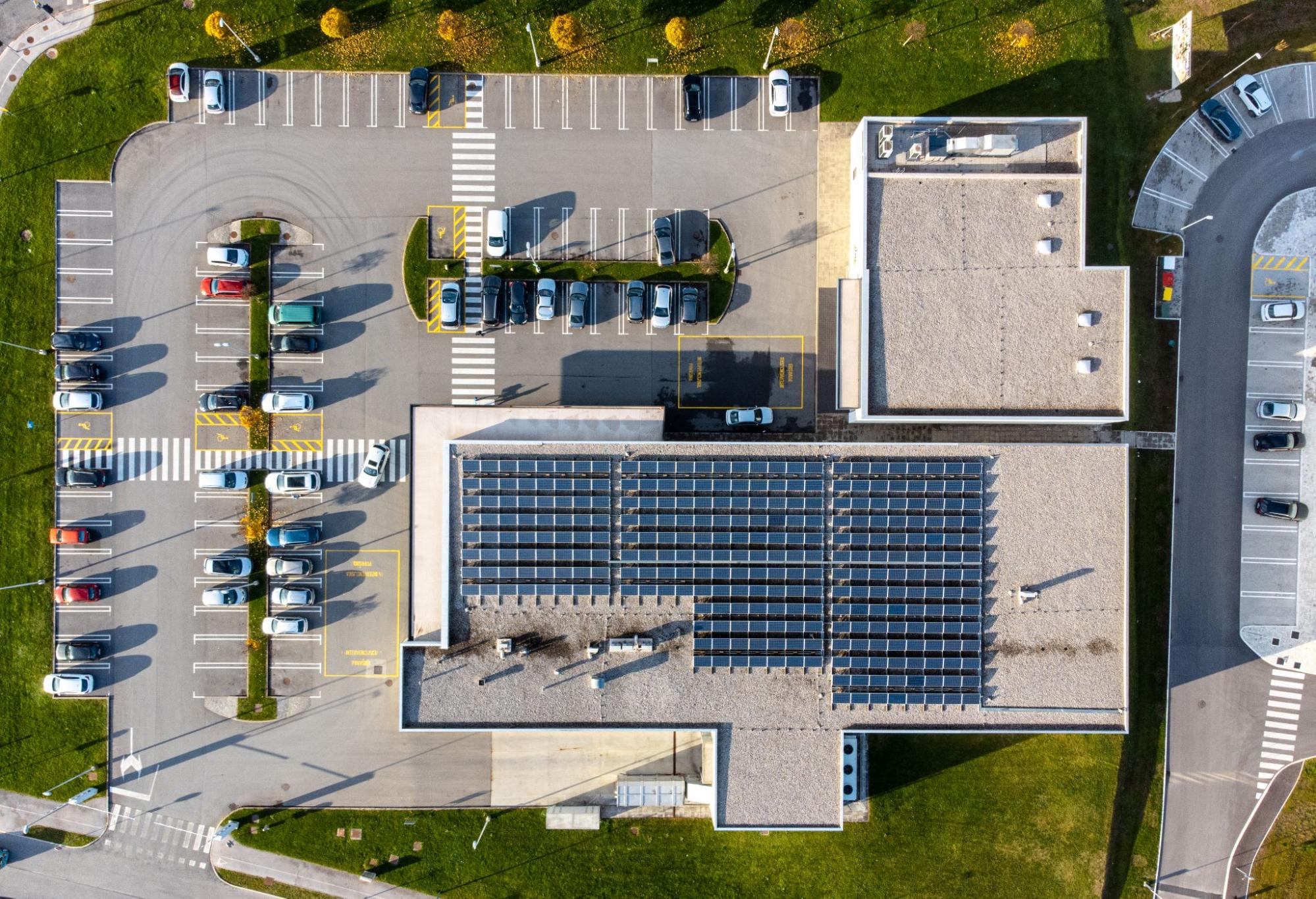When we think of commercial solar, many only think of the renewable energy goals of businesses. Nonprofit organizations can also benefit from solar energy systems. Commercial solar offers nonprofits and tax-exempt organizations sustainable energy, reduced operational costs and strengthens mission commitments.
As solar has continued to become more popular, it has become more accessible for nonprofits. Especially as the Inflation Reduction Act of 2022 provides direct payment options to assist nonprofits with solar adoption costs.
Enact has helped nonprofits — including houses of worship and educational institutions — get the right solar solution for their operations. Using Enact’s award-winning software, our team of energy advisors can design custom solar and battery storage systems based on your energy needs and goals.
What is Commercial Solar for Nonprofits?
Commercial solar refers to solar energy systems installed on businesses or large properties, like the headquarters of a nonprofit organization. These systems use the sun’s energy to generate electricity, helping nonprofits lower their energy bills and reduce their environmental impact.
For nonprofits, adopting commercial solar offers multiple benefits. First, it cuts operating costs by reducing the amount of electricity purchased from the utility grid. Since nonprofits often work with tight budgets, these savings can make a big difference. Solar energy also protects against rising utility rates, offering more control over long-term energy expenses.
Another advantage is the environmental impact. Many nonprofits have a mission to serve their communities and the planet. By switching to solar, they can reduce their carbon footprint, showing their commitment to sustainability. This can also appeal to donors and volunteers who care about the environment.
Nonprofits may also qualify for special financing options, such as grants or low-interest loans, making solar more affordable. Some government programs and utility companies offer incentives that reduce the upfront costs of installation.
In short, commercial solar is a powerful tool that can help nonprofits save money, protect the environment and invest more resources in their missions.
Key Benefits of Solar Energy for Nonprofits
Reduced Operating Costs
For many nonprofits, operating on limited budgets is a constant challenge, with every dollar saved able to directly support their mission. By adopting solar energy, nonprofits can significantly reduce electricity bills, freeing up resources for their core programs and services.
Over time, the cost savings from solar can be substantial, providing long-term relief from rising utility costs and helping nonprofits reinvest saved funds back into their work. This financial benefit enables organizations to remain focused on making a positive impact in their communities rather than managing increasing operational expenses.
Protection from Rising Costs
Solar energy provides a powerful shield against the rising and often unpredictable costs of traditional energy sources. As utility rates continue to rise due to factors like fuel price volatility, energy demand and aging grid infrastructure, relying on solar power offers a level of financial stability that can be invaluable.
A solar energy system allows nonprofits to generate a portion — or even the majority — of their own electricity, which reduces their dependency on utility companies and helps them avoid future rate hikes. With a solar power system in place, energy costs become more predictable, allowing nonprofit organizations to budget more effectively over time. This consistency can be a game-changer, especially for organizations with limited funding and fixed budgets, as it enables them to allocate funds confidently and continue supporting their programs without fear of sudden spikes in utility bills.
With solar’s typical lifespan of 25 years or more, nonprofits can count on these financial protections for decades, giving them peace of mind and the freedom to focus on fulfilling their mission instead of worrying about rising operational costs.
Environmental Impact and Mission Alignment
Going solar aligns with many nonprofits’ environmental and social responsibility goals, demonstrating a commitment to sustainability. Solar energy directly reduces a nonprofit’s carbon footprint by lessening its dependence on fossil fuels, which has both environmental and reputational benefits.
Solar energy is a clean, renewable resource that considerably lowers carbon emissions. By going solar, your nonprofit demonstrates its dedication to environmental responsibility and boost its reputation in the community.
Organizations that adopt green practices often strengthen their public image, showing that they walk the talk when it comes to sustainability. Adopting solar energy presents your organization as a sustainability leader. By choosing solar, nonprofits can actively support the transition to clean energy, enhancing their credibility and inspiring others within their network to do the same.
Energy Resilience and Independence
Energy resilience is essential for nonprofits that provide critical services, such as shelters, community centers, or food banks. By installing solar panels with battery storage, nonprofits can ensure a reliable source of backup power during grid outages. This energy independence allows them to continue their services uninterrupted, even during extreme weather events or emergencies. For nonprofits, this resilience adds an extra layer of security, allowing them to serve their communities consistently and dependably, regardless of the broader energy landscape.
Increased Funding Opportunities and Community Support
Nonprofits that adopt solar energy can unlock additional funding opportunities, as solar installations appeal to donors and grantmakers focused on green and sustainable initiatives. Many public and private grants prioritize projects that incorporate sustainability and environmental stewardship, giving nonprofits a unique chance to access these funds.
Additionally, the community is often more likely to support organizations that demonstrate a commitment to environmental and social responsibility. Solar energy projects can help nonprofits expand their donor base, attracting new supporters and strengthening relationships with those who prioritize sustainability.
Each of these benefits adds up, making solar energy a powerful tool for nonprofits to cut costs, enhance their public image, improve operational resilience and attract additional funding—all while supporting the transition to a cleaner, more sustainable future.

Are There Incentives For Nonprofit Solar Energy Systems?
Yes, there are incentives for nonprofits and other tax-exempt organizations to adopt solar energy systems in the U.S. There are numerous benefits to solar energy systems that cut costs and further nonprofit missions — but many nonprofits lack the funding to go solar. The Inflation Reduction Act has expanded access for solar installations, which includes offering nonprofits, educational institutions, and state, local and tribal government organizations.
While businesses and homes can claim a portion of their solar panel system off as an investment tax credit, tax-exempt organizations — like nonprofits — can’t benefit from tax credits. Thankfully, the Inflation Reduction Act provides nonprofits with a “direct pay” option.
Direct pay allows nonprofits to receive payments equivalent to these credits from the IRS. This shift enables various nonprofits, schools and local governments to invest in renewable energy projects — with assets such as solar panels and battery storage.
Things to Think About Before Your Nonprofit Goes Solar
To start your nonprofit’s solar journey:
- Evaluate Energy Needs: Assess your current energy use to see how much electricity you could generate with solar. Prepare a copy of your utility bills and think of future goals that could change your energy consumption — such as building additions or electric vehicle charging stations.
- Consult Experts: Contact Enact for a customized proposal based on your individual requirements. Our experts can help throughout the process.
- Explore Financing Options: Investigate the financing options that best suit your budget and financial position. Enact works with a wide variety of financing and payment options.
- Review Incentives: Take advantage of federal and state incentives to dramatically lower installation expenses.
By embracing commercial solar energy, your organization may save money, improve its environmental impact and encourage community engagement — all while remaining loyal to its goal. Transitioning to renewable energy not only makes financial sense, but it also establishes your organization as a sustainability leader.

How Enact Supports Nonprofits Solar Journey
Enact Solar is committed to helping nonprofits achieve long-term financial savings and energy independence through customized solar solutions. Recognizing the specific challenges nonprofits face, such as budget constraints and fluctuating energy costs, Enact offers tailored services to make solar adoption as accessible and cost-effective as possible. Our team of energy advisors works closely with nonprofits to develop systems that maximize energy savings and align with sustainability missions.
Through Enact’s comprehensive software, we simplify each step of the solar journey. We begin with a detailed needs assessment to understand energy usage and budget goals, then create a custom design that meets these needs. Enact ensures nonprofits can make the most of available resources by offering virtually unlimited equipment and financing/payment options. Our end-to-end approach extends to overseeing the installation process and offering real-time performance monitoring through the Enact Home solar monitoring app, helping organizations track their solar investment and measure environmental impact.
For nonprofits dedicated to both financial responsibility and environmental stewardship, partnering with Enact Solar means gaining an ally dedicated to advancing their mission through clean, affordable energy solutions. Whether reducing operating costs, achieving energy independence, or enhancing sustainability, Enact is here to support nonprofits every step of the way.
Schedule a free consultation today and receive a free custom solar proposal — no strings attached. Our team of friendly energy advisors can help your nonprofit start its solar journey — by providing simplicity, transparency and choice.

